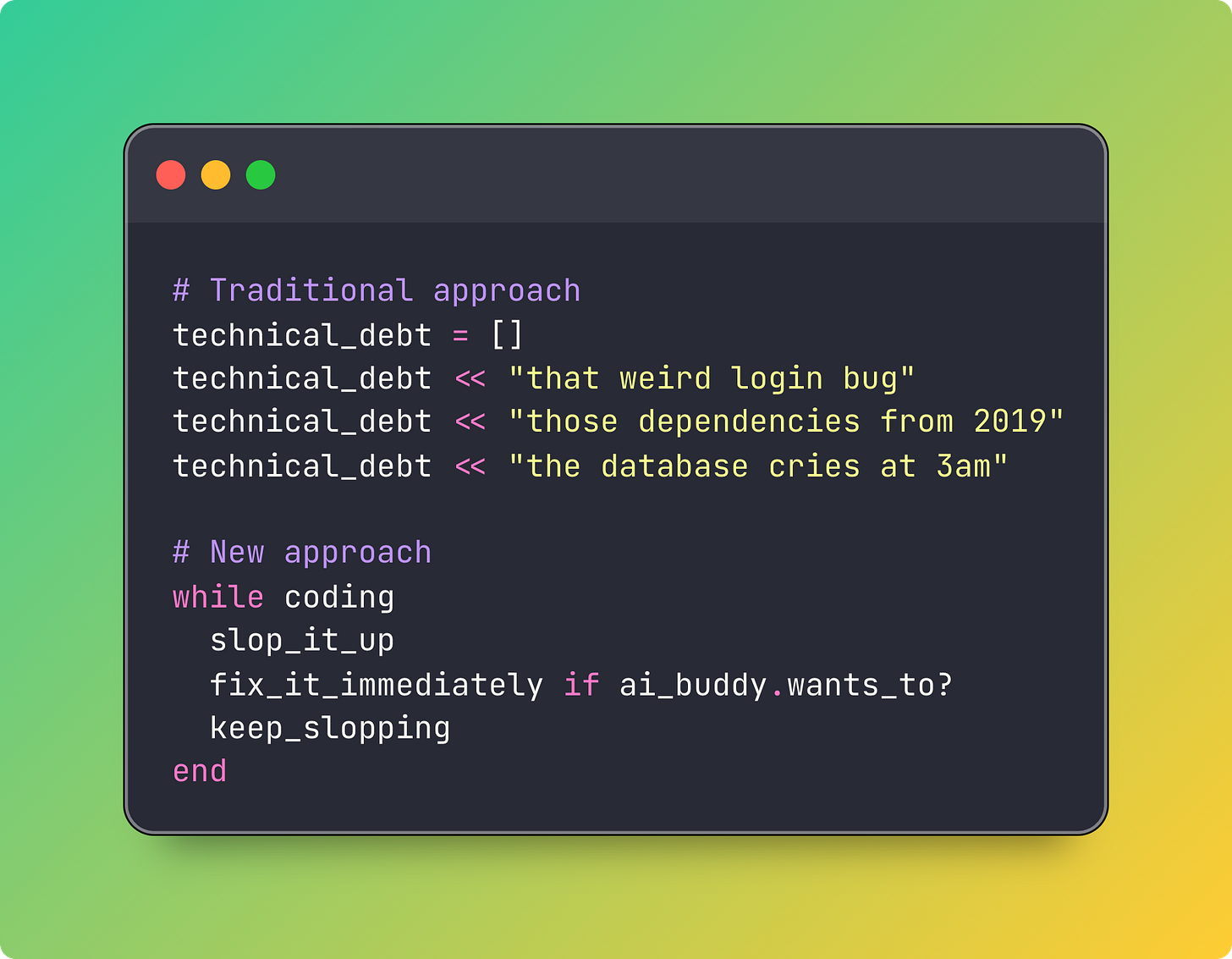Entering Technical Debt's ZIRP Era
The manifesto for slop driven development
So lets talk about money a little bit, ok? For like a decade, interest rates were basically zero. They called it ZIRP (Zero Interest Rate Policy) and suddenly everyone was borrowing like mad. Paying off debt wasn’t happening any faster. Carrying it just cost nothing.
Companies leveraged themselves to the moon. Why not? It was basically unlimited free money.
And now it's happening to code.
The Parable of the Overleveraged Tortoise
I knew this tortoise once who carried a perfectly reasonable shell. Hexagonal plates, decent weatherproofing, traditional design passed down through generations. Then ZIRP hit.
"Why have one shell layer," the tortoise mused, "when I could have thirty?"
So the tortoise borrowed. And built. And borrowed. And built. The shell became a fortress. Layers upon layers upon layers. Some had purposes. Some didn't. Some the tortoise forgot about entirely.
"Aren't you worried?" his friend the anxious hare asked.
"About what? It costs nothing to carry them."
Enter the Age of Slop
People keep saying slop like it’s a bad thing.
Like we’re drowning in AI-generated garbage.
But have you ever watched a master chef at work? There’s flour on their sleeve, six pans going at once, half-prepped herbs scattered like confetti. They taste, adjust the acid, whisk a sauce, pull something from the oven early, toss in one last dash of salt, all in seconds.
To the untrained eye, it’s a mess. To them, it’s a practiced rhythm.
It looks like chaos. It looks like… slop.
I’ve tasted the slop. It’s delicious.
The Beautiful Chaos of Infinite Leverage
But look, I’m not saying that ZIRP made debt go away. I’m saying that it makes debt irrelevant.
Last weekend, Orta Therox posted "6 Weeks of Claude Code" and dropped this insight:
If you understand what you are doing, the capacity for building and handling the breadth of tasks which typically live within the remit of 'technical debt' do not need to be treated as debt and you can just do it as you are working on other things.
And something clicked for me. AI isn’t creating a technical debt crisis. We're in technical debt's ZIRP era!
When carrying costs approach zero, the rational strategy isn't to borrow less, it's to borrow MORE. Way more. Absurd amounts more.
Same with code now.
Why? Because the cost of carrying bad code has collapsed. Because now we can carry INFINITE amounts of it.
The Paradox of Lowered Standards
Here's the thing that would have horrified us five years ago: our standards should be getting LOWER, not higher.
Fear used to run the place. Fear of breaking the build, of untangling a stranger’s 4-year-old regex, of that ticket labeled ‘Small Fix’ that turns into a six-month expedition into the Mines of Legacy.
But fear is just interest on the loan. And the rate is now zero.
The old way:
Measure twice, cut once
Get it right the first time
Technical debt is cancer
The ZIRP way:
Cut 50 times, measure never
Get it wrong fast, then get it wrong better
Technical debt is inventory
When fixing code costs nothing, perfectionism is waste. When refactoring is instant, planning is procrastination.
The TODO isn't debt anymore. It's a placeholder for a conversation (just like what we used to say about user stories).
But What About Code Quality?
"But won't everything be terrible forever?" you might ask.
No! When you can refactor instantly, when AI can untangle any mess, when the cost of change approaches zero... quality emerges from quantity.
It's like evolution. You don't design the perfect organism. You slop out millions of mutations and let selection sort it out. Except now selection happens in milliseconds and the mutations are guided by something that's read every programming book ever written.
A Story About Standards
The tortoise's friend, a particularly anxious hare, watched the shell expansion with growing concern.
"Your code coverage is 3%!" the hare twitched, foot tapping at maximum speed.
"Coverage of what?" the tortoise replied slowly. "Half this code might not even run. I haven't checked."
"But... but... the velocity! The sprint metrics! The burndown charts!"
The tortoise looked at the hare with infinite patience. "The standards were written when fixing code took weeks. Now it takes seconds. Should we still be using the same standards?"
The hare had no answer. The hare is still sprinting in place, going nowhere fast.
The Part Where Everything Accelerates
You might not believe me yet, but this is going to get MORE extreme, not less.
Today: AI fixes your code in seconds
Tomorrow: AI fixes your code as you type it
Next week: AI fixes your code before you write it
Next month: AI writes code that doesn't need fixing because it's already explored all the wrong versions
But we're not there yet. We're in the messy middle. The ZIRP era. The time of infinite leverage and zero carrying costs.
Embrace the slop.
In Conclusion
ZIRP taught us that when money is free, the winners are those who borrow the most. Not because they're reckless, but because they understand the new physics.
Technical Debt's ZIRP era teaches us the same thing. When refactoring is free, when AI can untangle any mess, when the cost of change approaches zero...
The winners will be those who slop the most.






Without taking a position on the whole issue:
Married to a professor of veterinary medicine, it seems to me comparing the results of AI coding to the results of evolution ought to make you nervous. https://wiki.oddly-influenced.dev/view/welcome-visitors/view/your-body-is-a-gross-kludge
The lesson of medicine is that bodies are not designed for understandability or non-planned-for maintenance. You're essentially conceding that humans working on AI code will be as expensive and failure-prone as physicians working on bodies.
It's worth considering how bad humans are at predicting nonlinear effects (Dörner's /The Logic of Failure/ is good at that, https://www.hachettebookgroup.com/titles/dietrich-dorner/the-logic-of-failure/9780201479485/?lens=basic-books) That's the root of the oft-quoted Hemingway bit:
“How did you go bankrupt?” Bill asked.
“Two ways,” Mike said. “Gradually and then suddenly.”
That's an effect of how profoundly bad we are at understanding exponential growth.
If it were my money at stake, I'd want a some assurance that if AI hits a wall, I won't be left with the equivalent of a nasty autoimmune disease. That is: what are the risks? how will you monitor them? what's your disaster recovery plan?
The problem with a ZIRP is that those questions are b-o-r-i-n-g and you can't compete with those who skip them. You're out of business before they crash. ("The market can remain irrational longer than you can remain solvent.")
Similarly, there's a collective action problem. Our society is structured such that when the optimists' predictions go wrong, they don't pay for their mistakes – rather society as a whole does. See housing derivatives in 2008, the Asian financial crisis of the late '90s, etc. ZIRP makes it cheaper to be an optimist, but someone else pays the bill for failure (Silicon Valley Bank, Savings and Loan crisis)
It's weird to see ZIRP touted as a model, given the incredible overspending that took place, which had to be clawed back once ZIRP went away. (Most notably in tech layoffs, but I'm more concerned about all the small companies that were crushed because of financials, not because of the merit of their products.)
Please extend your analogy to the end of the AI ZIRP environment. Or will line go up forever?
"AI can untangle any mess" - not even close. Your general point is valid, but only applies in situations where the operator is competent and experienced and already knows how to manage technical debt. Current gen LLMs can't identify when something needs to be refactored and will let debt and indirection pile up until they're incapable of making progress.